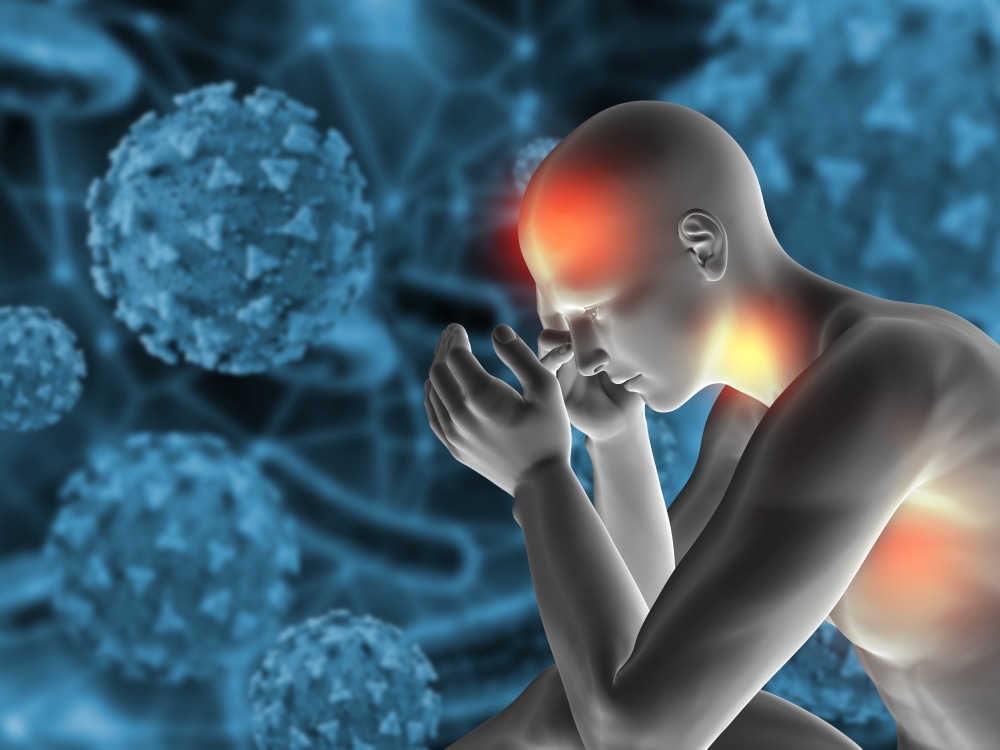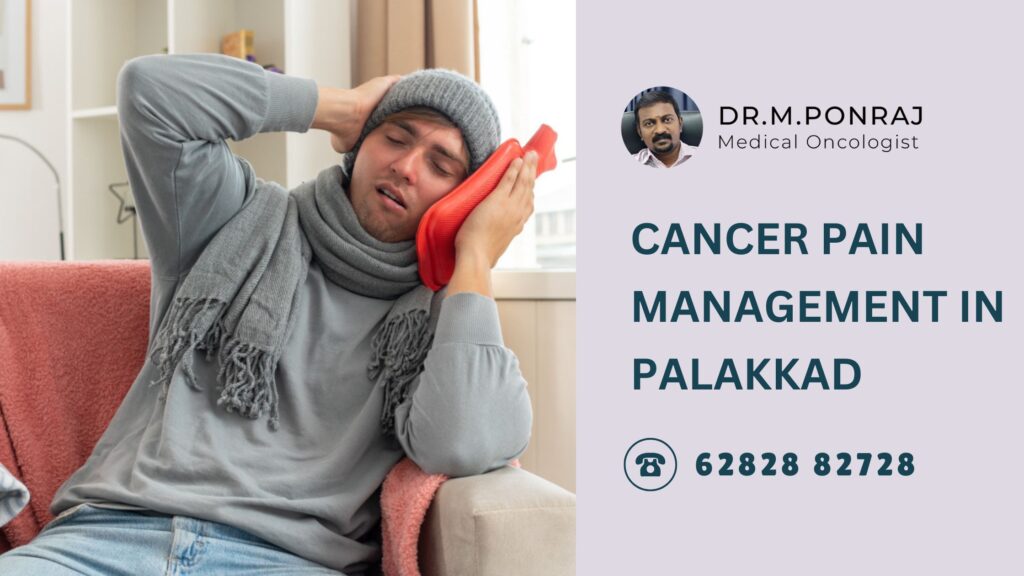Cancer is a devastating diagnosis that can have a profound impact on the physical, emotional, and psychological health of a patient. As a Medical Oncologist, my goal is not only to treat cancer but also to ensure that patients receive the support and care they need during their cancer journey. One of the most challenging aspects of cancer care is managing cancer pain. In Palakkad, a region where healthcare resources continue to improve, cancer pain management has become an essential part of cancer care, with innovative therapies and personalized approaches.
What is Cancer?
Cancer is a group of diseases that occur when cells in the body grow uncontrollably and form tumors. These cells can spread to other parts of the body through the bloodstream or lymphatic system, a process known as metastasis. Cancer can affect almost any part of the body and can cause a range of symptoms, including pain.
Understanding cancer and its treatments is crucial for patients, as it allows them to take an active role in their care. While treatments such as surgery, chemotherapy, radiation, and immunotherapy can be highly effective in managing cancer, they can also lead to cancer-related pain. Pain management is therefore an integral part of the treatment process.

Understanding Cancer Pain
Cancer pain is a significant concern for many patients, impacting their daily lives and overall well-being. It is not just a symptom of cancer itself but can also result from various treatment methods such as surgery, chemotherapy, and radiation therapy. The intensity and nature of cancer pain can vary widely—some patients experience mild discomfort, while others may suffer from severe, persistent pain.Managing cancer pain effectively is essential to improving a patient’s quality of life. With the right combination of medications, therapies, and supportive care, pain can be controlled, allowing patients to focus on recovery and maintaining their strength throughout their cancer journey .Read more about cancer pain management.
Why Cancer Pain Happens
Cancer pain can be caused by a variety of factors, depending on the type, location, and stage of the cancer. Some of the most common causes include:
Tumor Growth: As a tumor grows, it may put pressure on surrounding tissues, nerves, or organs, leading to pain.
Metastasis: When cancer cells spread to other parts of the body, they can damage healthy tissues and cause pain.
Treatment Side Effects: Chemotherapy, radiation, and surgery can all cause pain. For example, chemotherapy can cause nerve damage (neuropathy), while radiation can lead to inflammation in the treated area.
Infections: In some cases, cancer or its treatments can increase the risk of infections, which may lead to pain.
Bone Pain: Many cancers, such as breast, prostate, and lung cancer, commonly spread to the bones, causing significant pain.
What Can Help with Cancer Pain?
Managing cancer pain is essential to improving the quality of life for patients. There are several treatment options available that can effectively reduce or eliminate pain. At my practice in Palakkad, I provide personalized pain management strategies that cater to each patient’s unique needs. These may include:
Medications: Pain relief medications are the cornerstone of cancer pain management. They can range from over-the-counter pain relievers like acetaminophen and ibuprofen to stronger prescription medications such as opioids, which are used in more severe cases.
Physical Therapy: For some patients, physical therapy can help relieve pain by improving mobility, strengthening muscles, and reducing stiffness.
Surgical Options: In certain cases, surgery may be necessary to remove or reduce the size of the tumor that is causing pain.
Palliative Care: Palliative care focuses on improving the quality of life by managing symptoms like pain, nausea, and fatigue. It is an essential part of cancer care, especially for patients with advanced cancer.
Complementary Therapies: Techniques like acupuncture, massage, and meditation have been found to help reduce cancer pain and improve overall well-being.
At Dr. Ponraj’s clinic in Palakkad, we take a holistic approach to cancer pain management, using a combination of these methods to ensure that each patient experiences relief.
Meet Dr. Ponraj: Your Partner in Cancer Care
Dr. Ponraj is a dedicated and compassionate oncologist with a deep commitment to providing the best possible care for cancer patients. Specializing in comprehensive cancer care, I work with each patient to create a personalized treatment plan that addresses not just the cancer itself but also any associated pain and symptoms. My goal is to empower my patients to take charge of their health and to provide a path forward that leads to the best possible outcome.
With years of experience and a compassionate approach to patient care, I strive to revolutionize cancer care in Palakkad by combining cutting-edge treatments with empathetic support. I offer a wide range of services, including chemotherapy, immunotherapy, radiation therapy, and supportive care, all of which are designed to manage not only the cancer but also the pain associated with it.For more information on cancer pain management in Palakkad, contact Dr. Ponraj today.
Why Choose Dr. Ponraj for Cancer Pain Management in Palakkad?
Choosing the right oncologist is crucial to achieving the best possible outcomes during your cancer journey. Here are some reasons why Dr. Ponraj is the right choice for cancer pain management in Palakkad:
Expertise in Comprehensive Cancer Care: I offer a comprehensive approach to cancer treatment, focusing on every aspect of the disease, from diagnosis to pain management.
Personalized Treatment Plans: Every patient is unique, and I work closely with each one to develop a customized treatment plan that aligns with their specific needs, goals, and preferences.
Cutting-Edge Technologies: I use the latest technologies and treatment options to manage cancer pain effectively, including advanced chemotherapy and radiation techniques.
Empathetic Care: Cancer can be overwhelming, and I provide the emotional and psychological support needed to help my patients through this challenging time.
Cancer Pain: Types, Causes, and How to Manage It
Cancer pain can be classified into different types based on its origin. These include:
Somatic Pain: This type of pain occurs when the tumor affects the skin, muscles, or bones. It is usually sharp or aching.
Visceral Pain: Visceral pain arises from the internal organs and tends to be deep and dull in nature.
Neuropathic Pain: When cancer or treatment damages nerves, it can result in sharp, burning, or tingling pain. This is often treated with specific medications such as nerve blocks or anticonvulsants.
Understanding the type of pain and its cause is essential to developing an effective treatment plan. As a medical oncologist, I use a multidisciplinary approach to managing cancer pain, including medications, therapies, and support services.
Nutritional Strategies to Reduce Cancer Pain and Inflammation
A healthy diet is crucial for managing cancer pain and inflammation. Certain foods can help reduce pain and improve overall health during cancer treatment. Incorporating anti-inflammatory foods like turmeric, ginger, and omega-3 fatty acids can help manage pain and inflammation. Additionally, maintaining proper nutrition ensures that the body has the strength it needs to fight cancer and recover from treatment.
As part of my care plan for each patient, I work with nutritionists to create personalized dietary strategies that support cancer recovery and pain management.
How to Talk to Your Doctor About Cancer Pain
One of the most important aspects of cancer pain management is open communication with your healthcare provider. Don’t be afraid to talk about your pain—your oncologist needs to know exactly what you are experiencing in order to help. Be honest about the severity of your pain, when it occurs, and any treatments you are currently using. By keeping the lines of communication open, I can better manage your pain and ensure that your treatment plan is adjusted as necessary.
Sleep and Cancer Pain: How to Improve Rest and Recovery
Pain often interferes with sleep, and poor sleep can, in turn, make pain worse. Effective cancer pain management in Palakkad includes strategies to improve sleep, as proper rest is crucial for recovery and overall well-being. Here are some ways to enhance sleep quality while managing cancer pain:
- Pain Relief Before Bed: Taking pain medications as prescribed before sleep can help ensure that pain does not disturb your rest, improving overall sleep quality.
- Relaxation Techniques: Meditation, deep breathing, and gentle stretching can reduce anxiety and stress, making it easier to fall and stay asleep.
- Creating a Comfortable Sleep Environment: A cool, quiet, and dark room, along with comfortable bedding, can significantly improve sleep quality, helping patients rest more effectively.
For patients seeking comprehensive cancer pain management in Palakkad, addressing sleep disturbances is an essential part of holistic care. Proper rest supports the body’s healing process, making pain management more effective and enhancing the overall quality of life.
How Exercise Can Help Alleviate Cancer-Related Pain
While it might seem counterintuitive, regular physical activity can play a crucial role in cancer pain management in Palakkad. Exercise helps reduce stiffness, improve circulation, and release endorphins, which are natural painkillers. It also strengthens the muscles around affected areas, improving overall mobility and reducing the intensity of pain.
Incorporating exercise into the daily routine, under the guidance of a physician, can be an effective way to manage pain and improve overall health during cancer treatment. Patients seeking cancer pain management in Palakkad can benefit from personalized exercise programs that focus on enhancing flexibility, reducing inflammation, and promoting overall well-being.
Contact Dr. Ponraj: Your Trusted Oncologist in Palakkad
If you or a loved one is facing a cancer diagnosis, don’t hesitate to consult Dr. Ponraj for expert cancer care. With his experience, compassion, and advanced treatment methods, you are in capable hands.
Address: Thangam Hospitals of PMRC, Palakkad, Kerala
Contact: 62828 82728
Email: ponsmadasamy@gmail.com
FAQ
1. What causes cancer pain?
Cancer pain can be caused by tumor growth pressing on nerves or organs, cancer spreading to bones, nerve damage from treatments like chemotherapy, or post-surgical pain.
2. How can cancer pain be managed effectively?
Effective cancer pain management in Palakkad includes medications (such as opioids and nerve blockers), physical therapy, radiation, palliative care, and complementary therapies like acupuncture and relaxation techniques.
3. Is cancer pain always severe?
No, cancer pain varies. It can be mild, moderate, or severe, depending on the cancer type, stage, and location. Some patients experience intermittent pain, while others may have constant discomfort.
4. Can lifestyle changes help with cancer pain?
Yes, maintaining a healthy diet, regular light exercise, stress reduction, and proper sleep can all help improve pain levels and overall well-being.
5. What are the best medications for cancer pain?
Medications range from over-the-counter pain relievers (like acetaminophen and NSAIDs) to stronger prescription opioids, nerve pain medications, and steroid treatments, depending on the severity of the pain.
6. How does sleep impact cancer pain?
Poor sleep can worsen pain perception. Creating a comfortable sleep environment, practicing relaxation techniques, and taking prescribed pain medications before bedtime can improve sleep and aid recovery.
7. Can cancer pain be completely eliminated?
While pain can often be significantly reduced, complete elimination may not always be possible. However, with a personalized treatment plan, most patients experience better pain control and improved quality of life.
8. When should I talk to my doctor about cancer pain?
You should speak to your doctor as soon as you experience persistent or worsening pain. Early intervention ensures better pain control and prevents complications.
9. Is palliative care only for terminal cancer patients?
No, palliative care is beneficial at any stage of cancer. It focuses on symptom relief, including pain management, to improve the patient’s comfort and quality of life.
10. Where can I find expert cancer pain management in Palakkad?
Dr. Ponraj offers expert cancer pain management in Palakkad, providing personalized treatment plans, advanced therapies, and compassionate care to help patients manage pain effectively.

